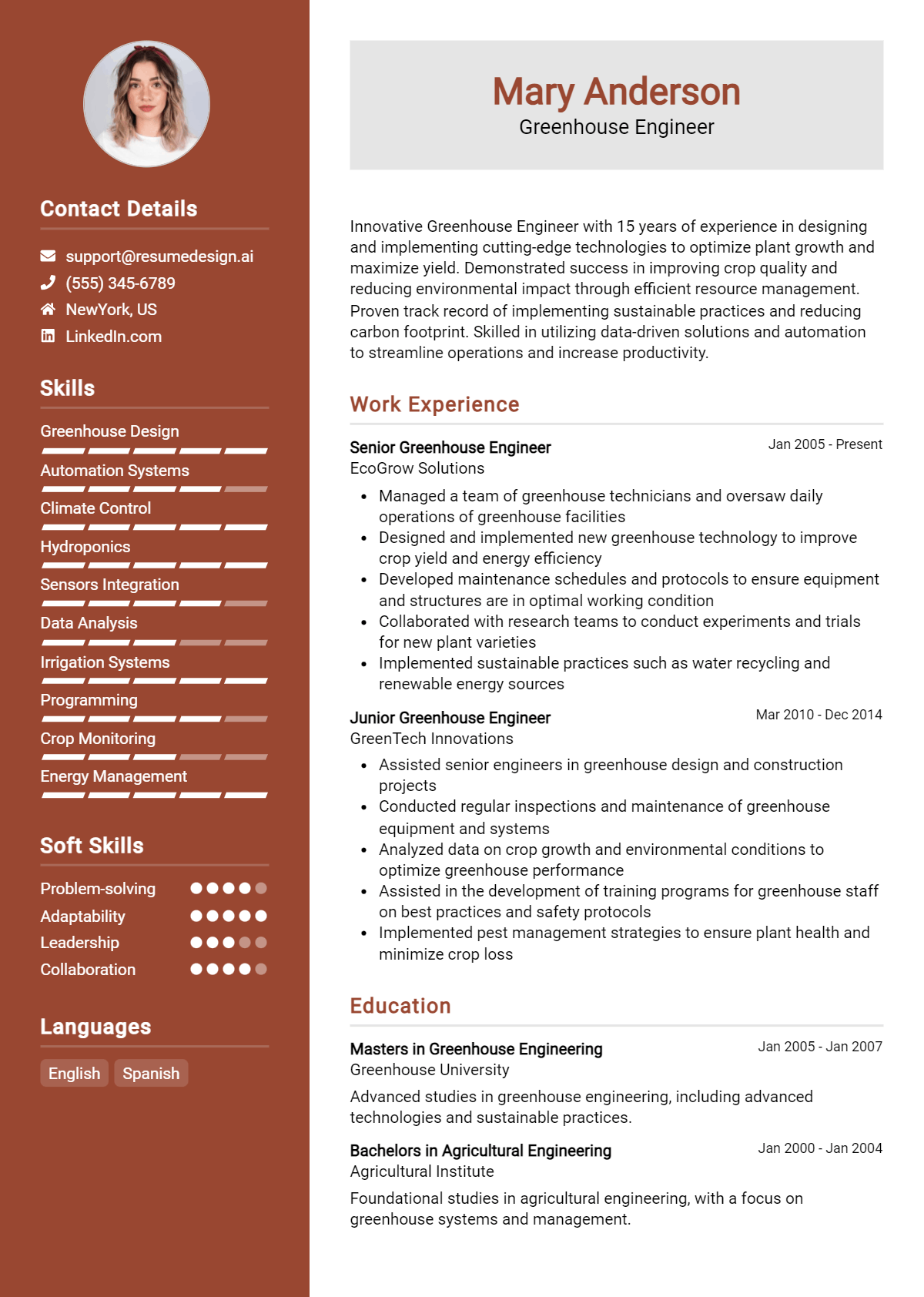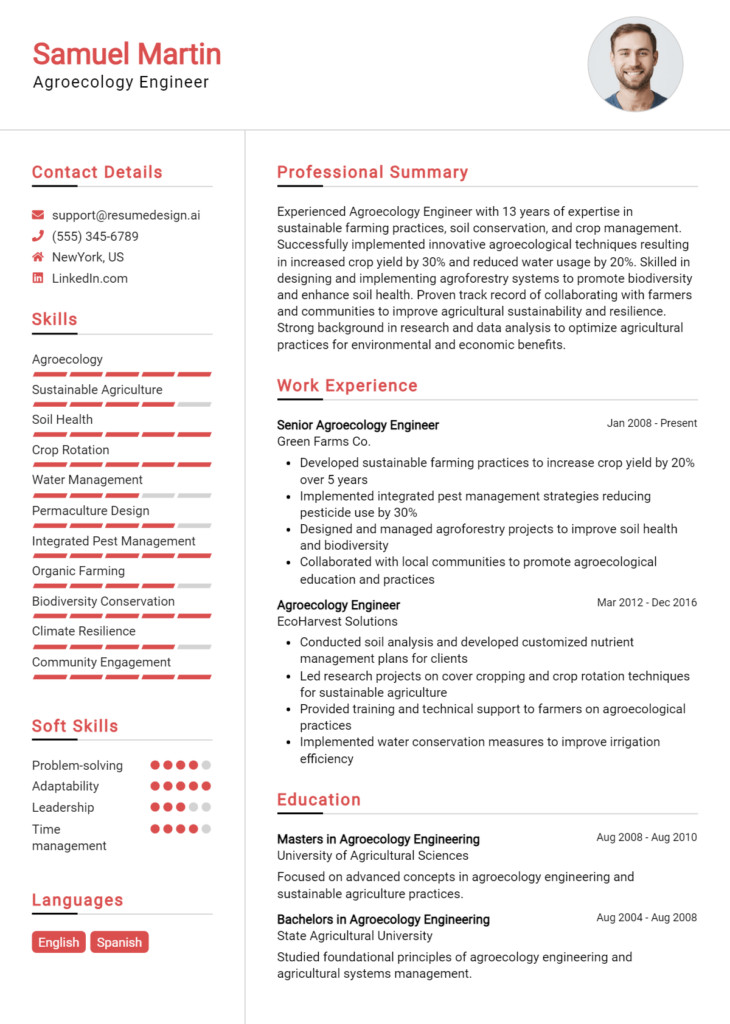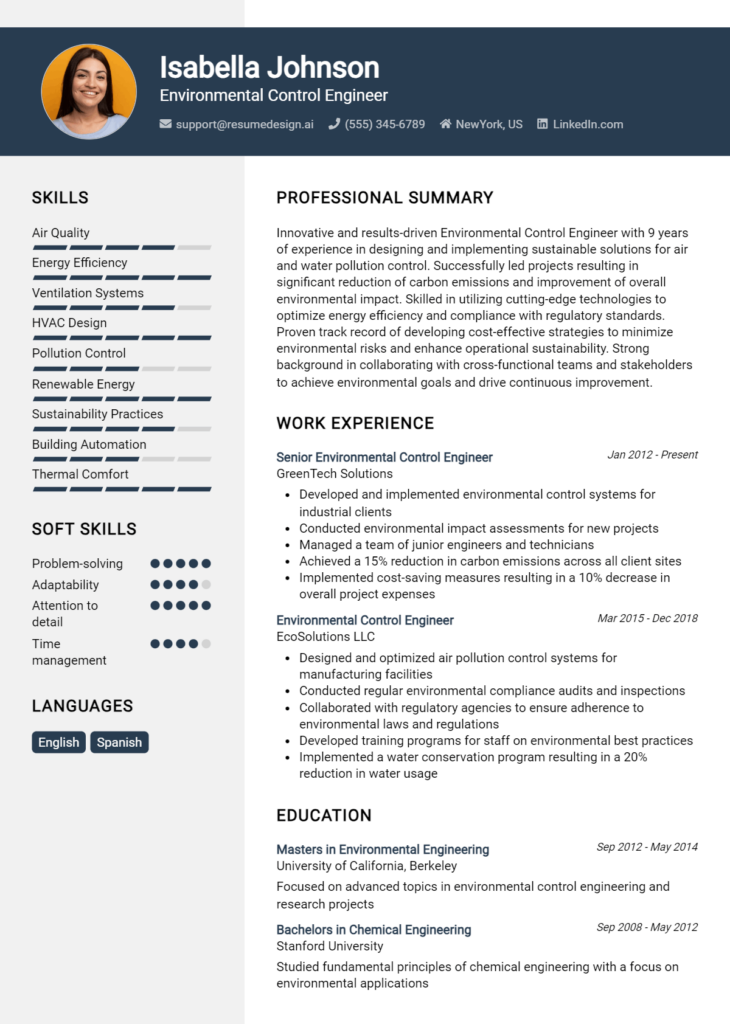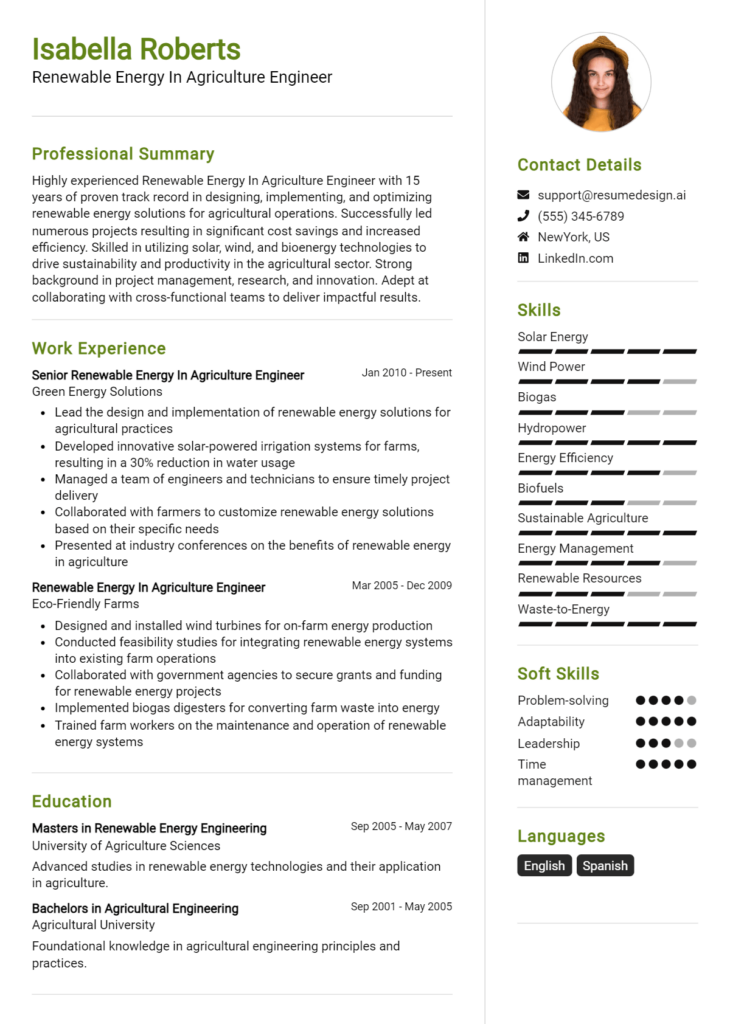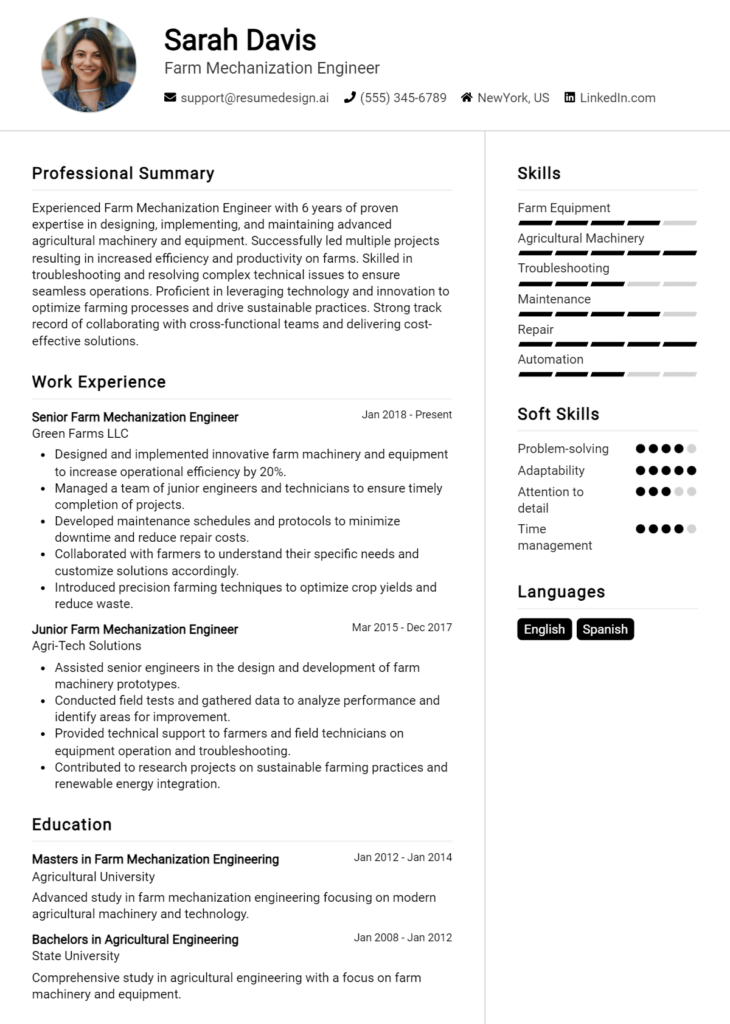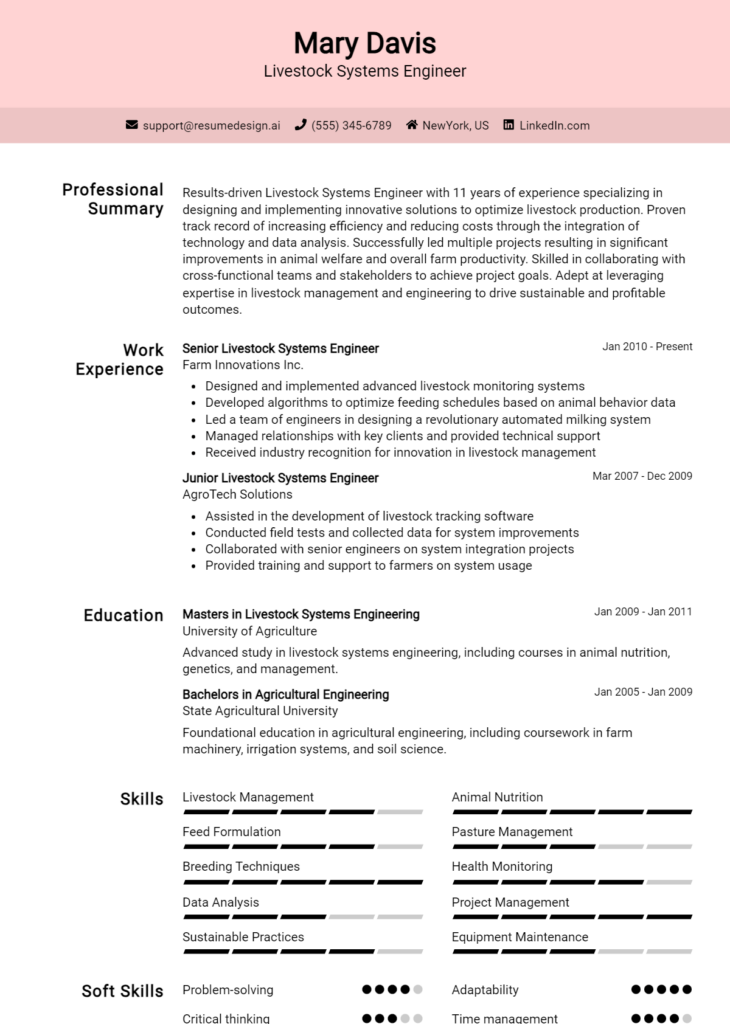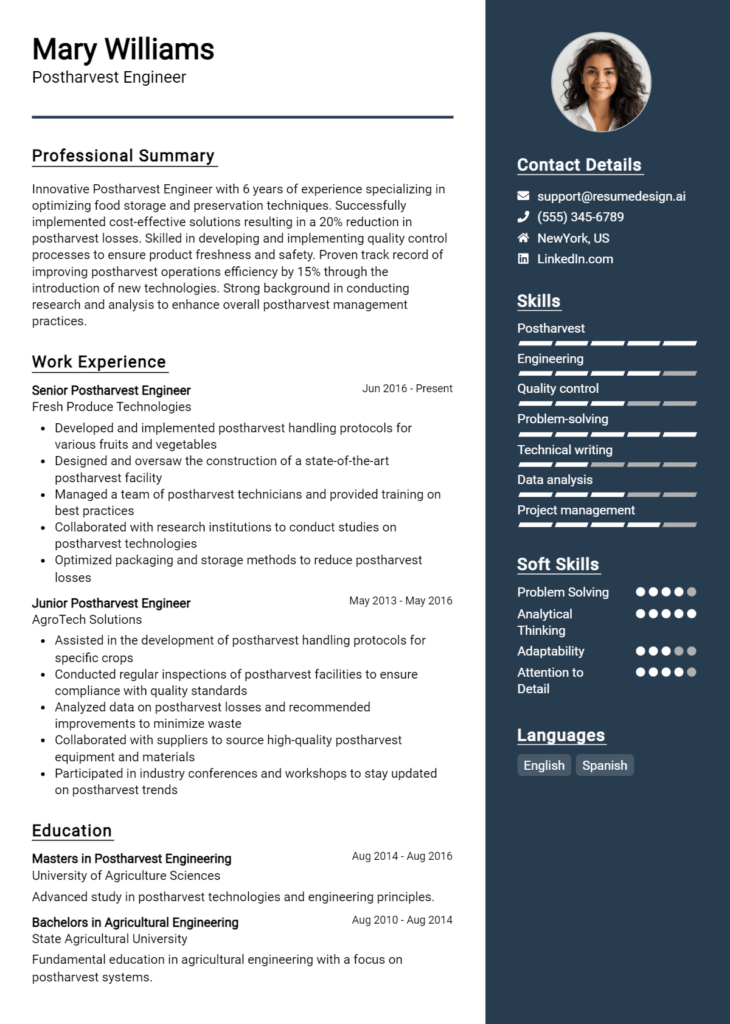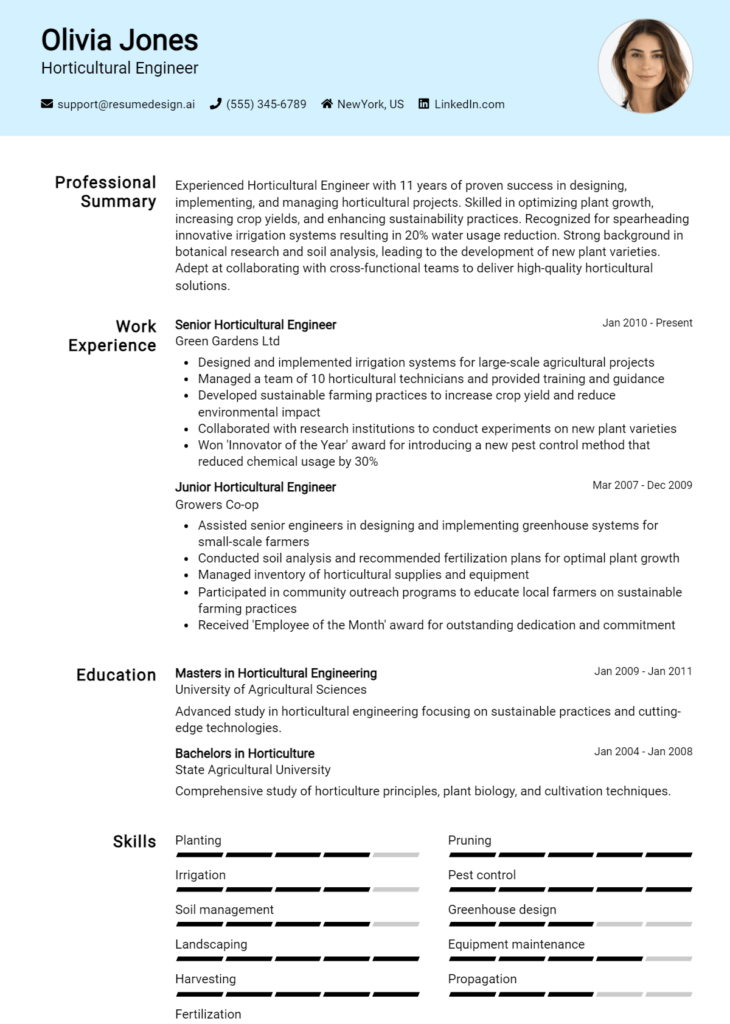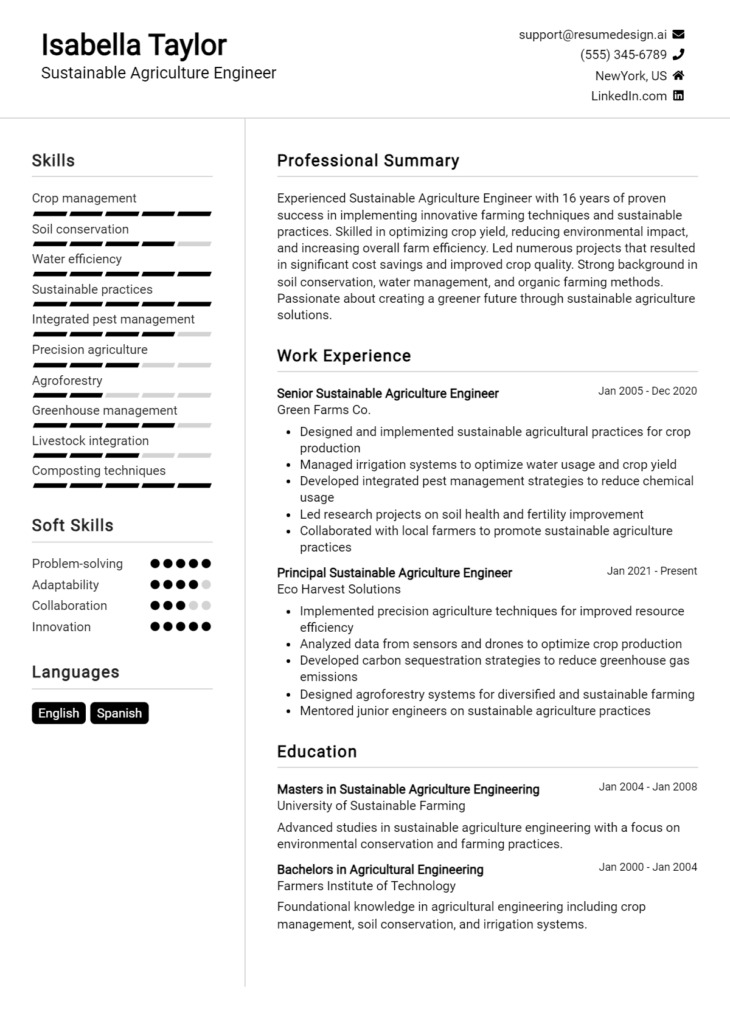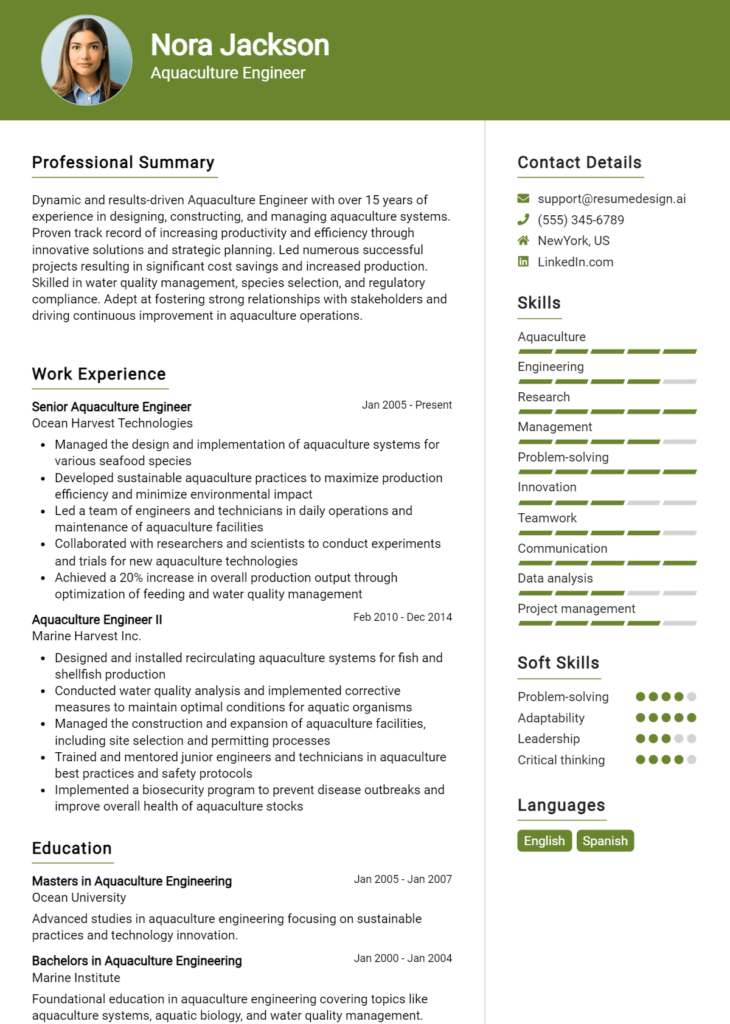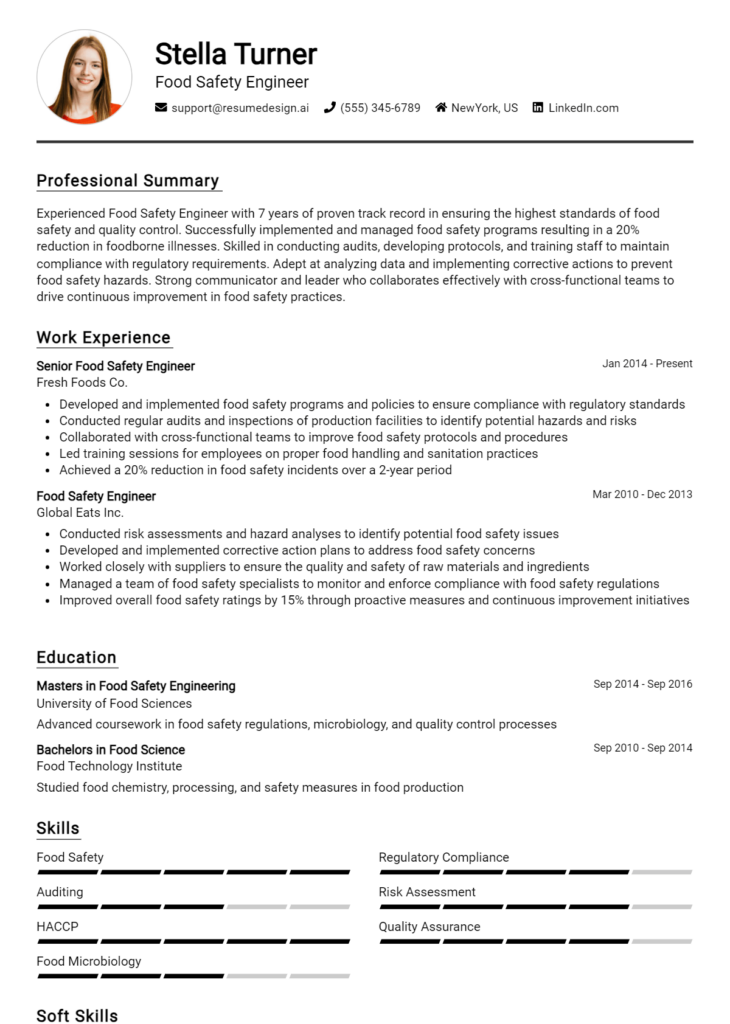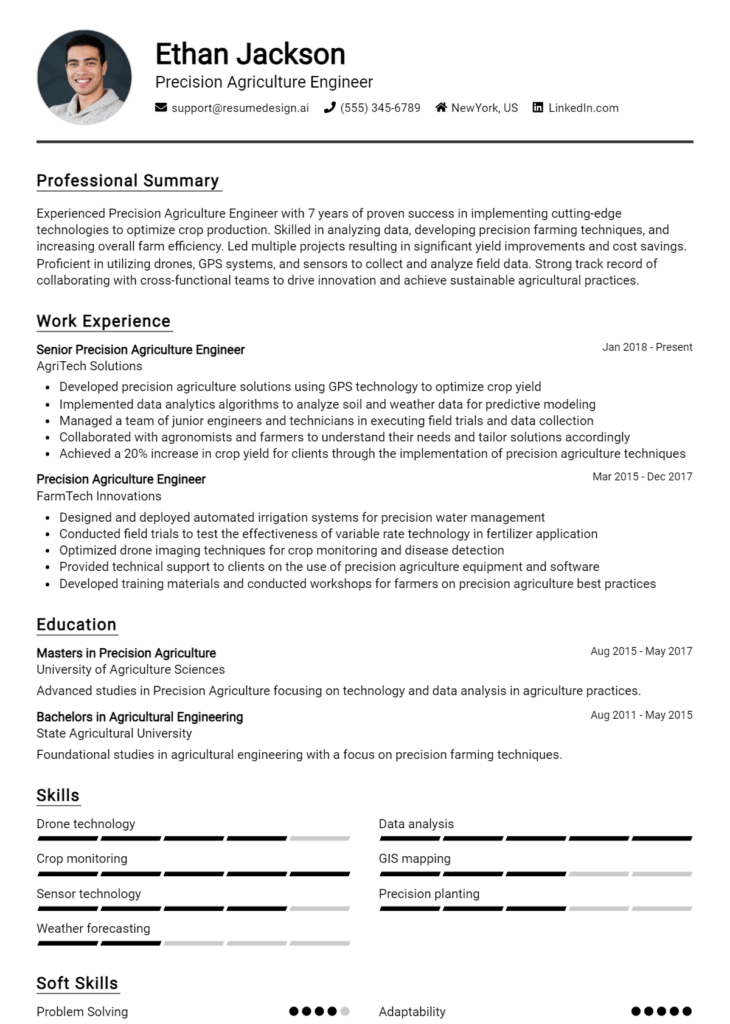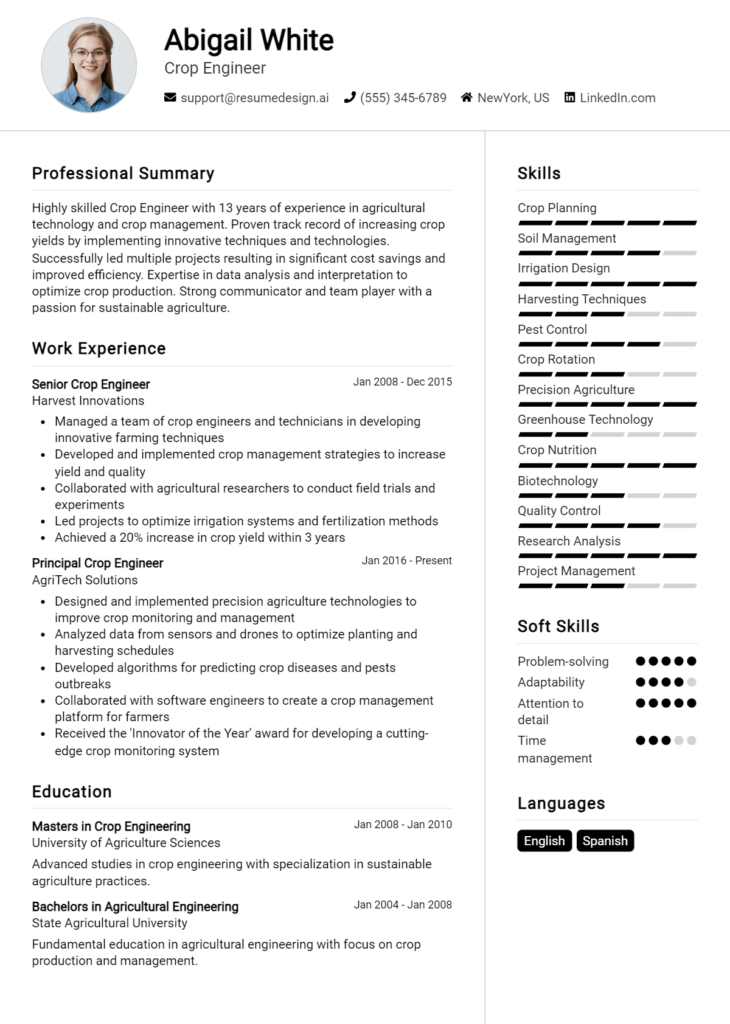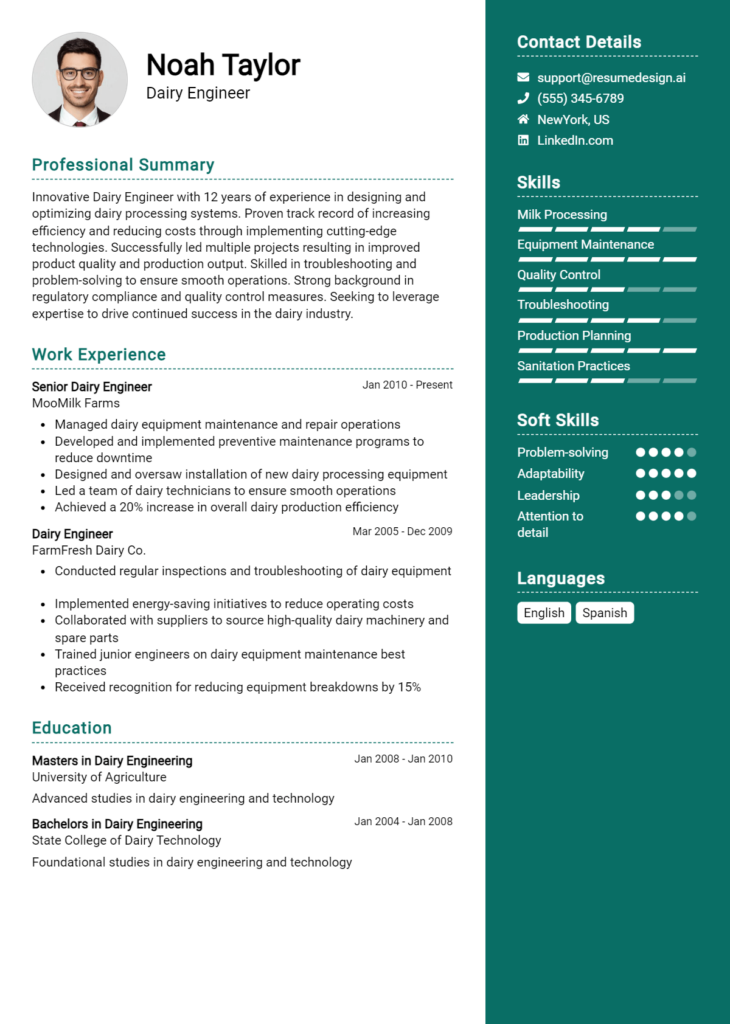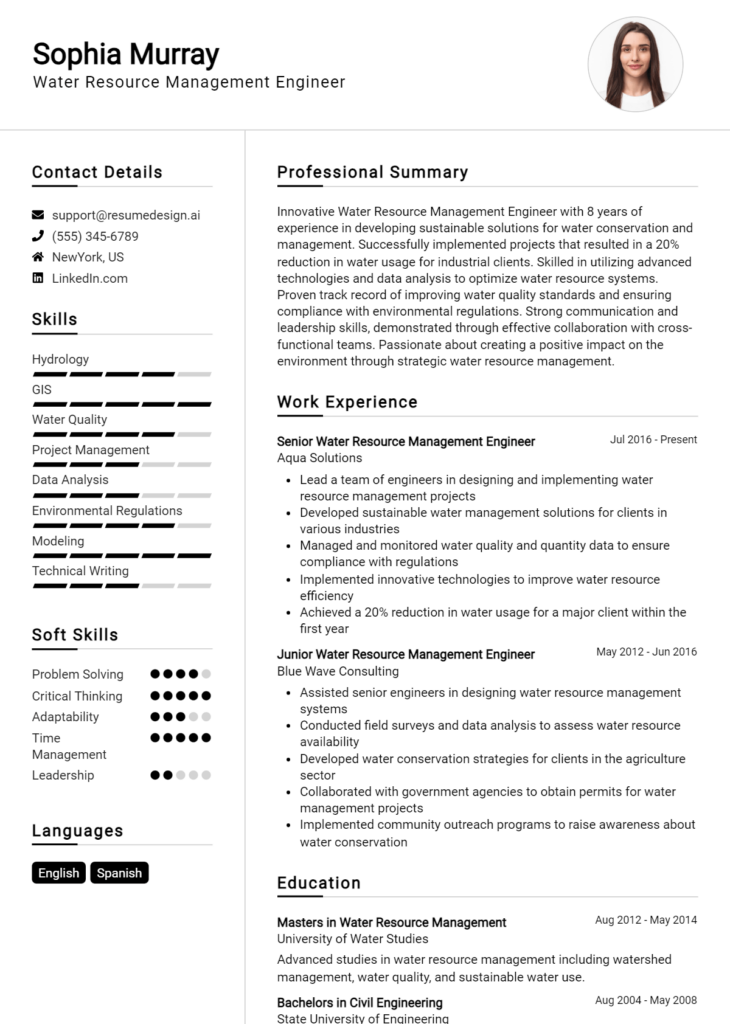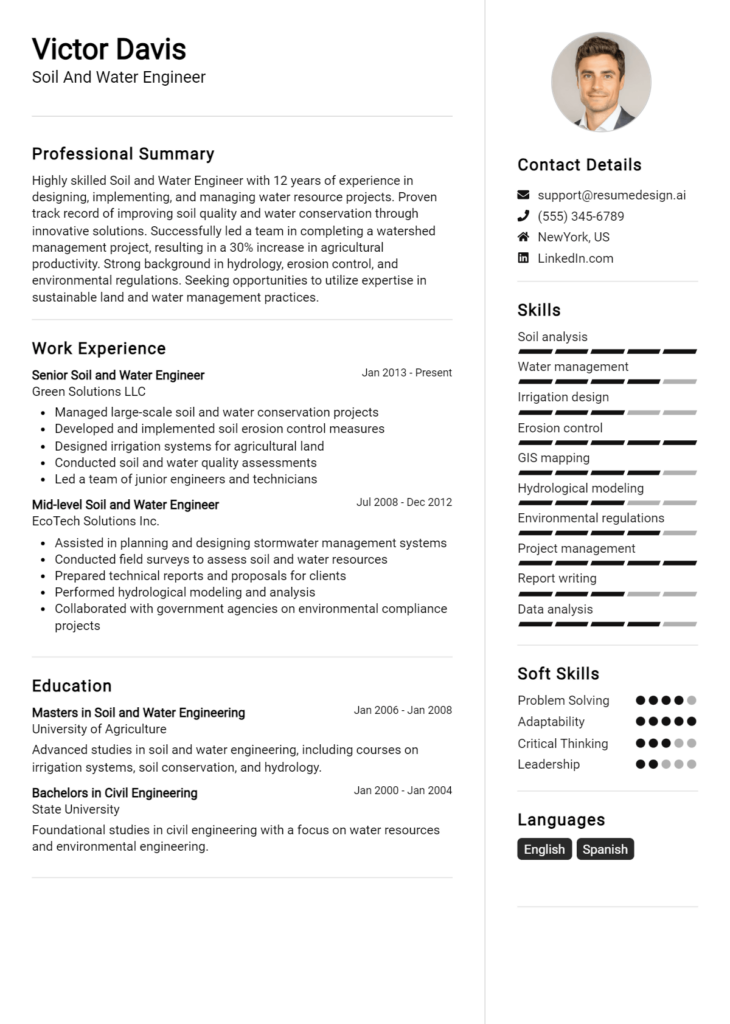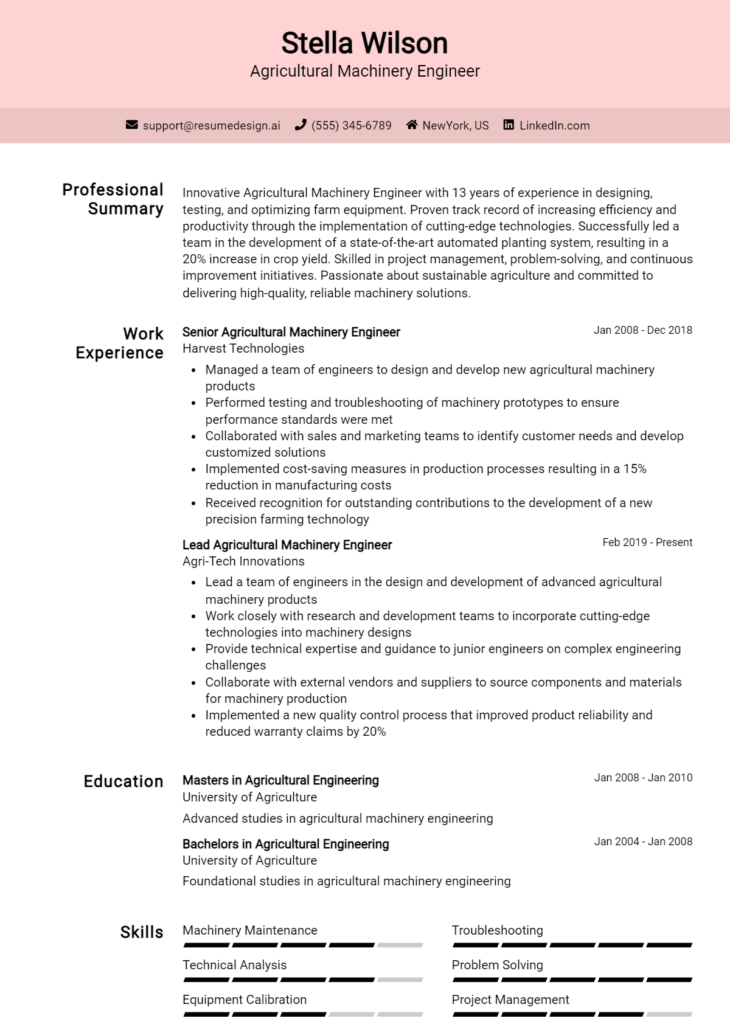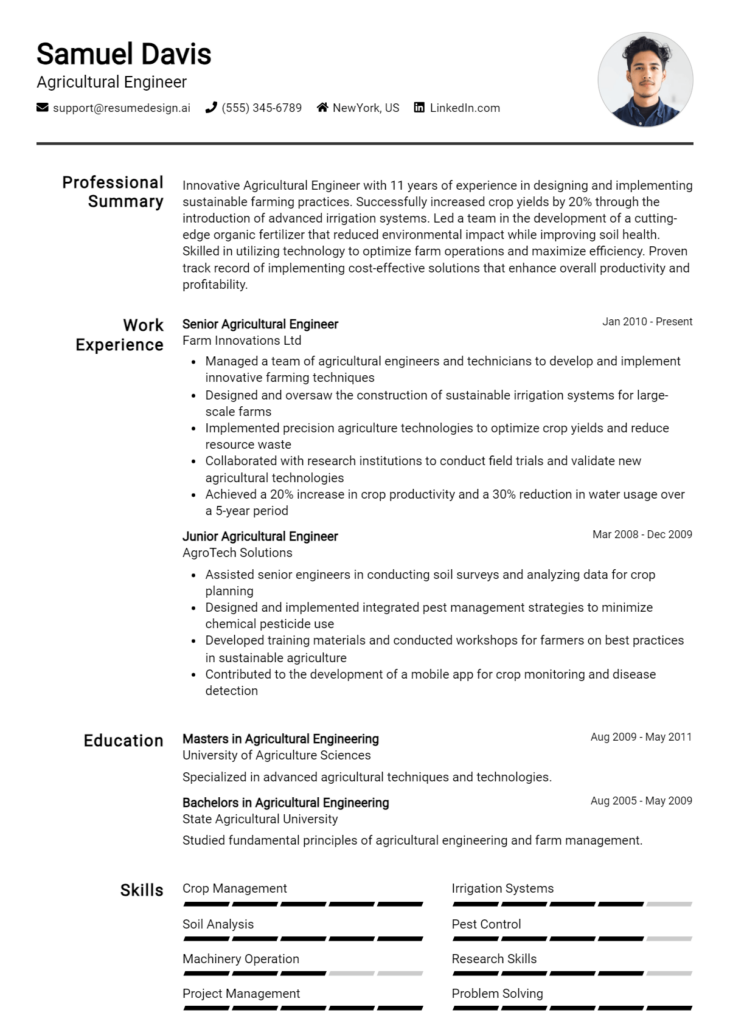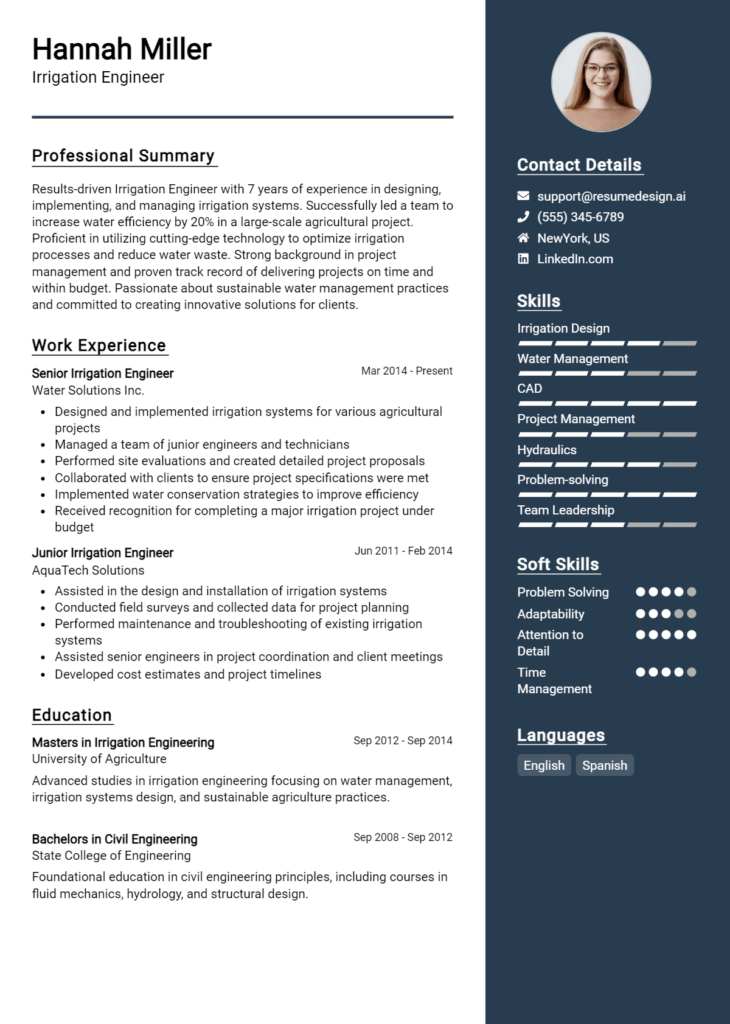Greenhouse Engineer Core Responsibilities
A Greenhouse Engineer plays a crucial role in optimizing plant production by integrating technical and operational expertise across various departments. Key responsibilities include designing and maintaining greenhouse systems, managing climate controls, and ensuring efficient resource use. Strong problem-solving skills are essential for troubleshooting issues and improving processes. These competencies contribute significantly to organizational goals, and a well-structured resume can effectively highlight these qualifications, showcasing a candidate's ability to adapt and collaborate within a multidisciplinary environment.
Common Responsibilities Listed on Greenhouse Engineer Resume
- Design and implement greenhouse layouts and systems.
- Monitor and control environmental conditions for optimal plant growth.
- Conduct research on plant health and growth parameters.
- Manage irrigation and nutrient delivery systems.
- Collaborate with horticulturists and agricultural scientists.
- Analyze data to improve greenhouse operations and productivity.
- Develop maintenance schedules for equipment and infrastructure.
- Train staff on best practices in greenhouse management.
- Ensure compliance with safety and environmental regulations.
- Implement energy-efficient practices and technologies.
- Conduct cost analyses to optimize budget allocations.
- Maintain records of plant performance and environmental conditions.
High-Level Resume Tips for Greenhouse Engineer Professionals
In today's competitive job market, a well-crafted resume is crucial for Greenhouse Engineer professionals seeking to make a lasting impression on potential employers. Often the first point of contact, your resume serves as a powerful tool to showcase not just your technical skills but also your accomplishments and unique qualifications. A compelling resume can set you apart from other candidates, reflecting your expertise in greenhouse technology, agricultural engineering, and sustainable practices. This guide will provide practical and actionable resume tips specifically tailored for Greenhouse Engineer professionals, helping you to effectively communicate your value to prospective employers.
Top Resume Tips for Greenhouse Engineer Professionals
- Tailor your resume to match the specific job description, highlighting relevant skills and experiences that align with the employer's needs.
- Showcase your experience with greenhouse systems, including climate control, irrigation, and hydroponics.
- Quantify your achievements where possible; for example, mention how you improved yield by a percentage or reduced energy costs by a specific amount.
- Highlight industry-specific skills such as knowledge of plant biology, pest management, and sustainable farming practices.
- Include certifications or licenses relevant to greenhouse engineering, such as LEED certification or pesticide application licenses.
- Use action verbs to describe your responsibilities and accomplishments, such as "designed," "implemented," or "optimized."
- Incorporate any relevant software proficiencies, such as experience with greenhouse management software or data analysis tools.
- Consider adding a summary statement at the beginning of your resume that encapsulates your career goals and key qualifications.
- Keep your formatting clean and professional, ensuring that your resume is easy to read and visually appealing.
- Proofread for errors and ensure that your contact information is up to date, making it easy for potential employers to reach you.
By implementing these tips, you can significantly increase your chances of landing a job in the Greenhouse Engineer field. A targeted, achievement-focused resume will not only demonstrate your qualifications but also showcase your passion for sustainable agriculture and innovation, making you a standout candidate in the eyes of hiring managers.
Why Resume Headlines & Titles are Important for Greenhouse Engineer
As a Greenhouse Engineer, crafting an effective resume is crucial to stand out in a competitive job market. One of the key elements of a successful resume is the headline or title, which serves as the first impression for hiring managers. A strong headline can immediately grab attention and convey a candidate's key qualifications in a concise and impactful manner. It should be relevant to the position being applied for, encapsulating essential skills, experiences, or achievements that align with the job requirements. By providing a focused and engaging headline, candidates can enhance their chances of being noticed and considered for the role.
Best Practices for Crafting Resume Headlines for Greenhouse Engineer
- Make it concise: Limit the headline to one or two impactful phrases.
- Be role-specific: Use keywords that directly relate to the Greenhouse Engineer position.
- Highlight key strengths: Focus on your most relevant skills or accomplishments.
- Use action words: Start with strong verbs to convey confidence and expertise.
- Avoid jargon: Use clear and straightforward language that is easily understood.
- Tailor for each application: Customize the headline based on the job description.
- Focus on results: Highlight outcomes or achievements that demonstrate your effectiveness.
- Consider the employer’s needs: Align your headline with what the employer is seeking in a candidate.
Example Resume Headlines for Greenhouse Engineer
Strong Resume Headlines
Innovative Greenhouse Engineer with 5+ Years of Experience in Sustainable Horticulture
Expert in Automated Climate Control Systems for High-Efficiency Greenhouse Operations
Results-Driven Greenhouse Engineer Specializing in Hydroponic and Aeroponic Systems
Weak Resume Headlines
Engineer Looking for a Job
Greenhouse Expert
The strong headlines are effective because they are specific, informative, and highlight relevant experience or skills that align directly with the Greenhouse Engineer role. They capture the essence of what the candidate can bring to the table, making a compelling case for their candidacy. In contrast, the weak headlines fail to impress because they lack detail and specificity, making it difficult for hiring managers to gauge the candidate's qualifications at a glance. Generic titles do not provide a clear indication of the candidate’s strengths and can easily be overlooked in a stack of resumes.
Writing an Exceptional Greenhouse Engineer Resume Summary
A well-crafted resume summary is crucial for a Greenhouse Engineer as it serves as the first impression for hiring managers, quickly capturing their attention. This brief yet powerful section summarizes key skills, relevant experience, and notable accomplishments that make a candidate stand out. A strong resume summary should be concise, impactful, and tailored specifically to the job description, ensuring that it resonates with the employer's needs and highlights the candidate's suitability for the role.
Best Practices for Writing a Greenhouse Engineer Resume Summary
- Quantify Achievements: Use numbers and metrics to illustrate your contributions, such as increased crop yield percentages or reduced energy costs.
- Focus on Relevant Skills: Highlight specific skills that directly relate to greenhouse engineering, such as climate control systems, irrigation management, or plant biology.
- Tailor the Summary: Customize your summary for each job application by incorporating keywords and phrases from the job description.
- Keep it Concise: Aim for 2-4 sentences that deliver impactful information without overwhelming the reader.
- Showcase Professional Experience: Mention years of experience and relevant roles that align with greenhouse engineering responsibilities.
- Highlight Certifications: Include any relevant certifications, such as greenhouse management or environmental science, to enhance credibility.
- Use Action Verbs: Start sentences with strong action verbs to convey your contributions effectively.
- Emphasize Problem-Solving Skills: Illustrate your ability to solve common greenhouse issues, showcasing your critical thinking and innovation.
Example Greenhouse Engineer Resume Summaries
Strong Resume Summaries
Dedicated Greenhouse Engineer with over 5 years of experience optimizing hydroponic systems, achieving a 30% increase in crop yield while reducing water consumption by 20%. Proficient in climate control technology and sustainable agricultural practices.
Results-driven Greenhouse Engineer skilled in integrated pest management and greenhouse automation. Successfully led a project that decreased energy costs by 15% while improving plant health, resulting in a 25% reduction in pesticide use.
Innovative Greenhouse Engineer with a background in environmental science and 7 years of experience in large-scale greenhouse operations. Expert in designing climate control systems that enhanced production efficiency by 40% and improved resource management.
Weak Resume Summaries
Greenhouse Engineer with some experience in managing plants and systems. Looking for new opportunities in the field.
Experienced engineer interested in greenhouse projects. I have worked with some technologies but am open to learning more.
The strong resume summaries are considered effective because they provide specific, quantifiable achievements and directly relate to the responsibilities of a Greenhouse Engineer. They showcase relevant skills and experiences that align with the job, making a compelling case for the candidate's qualifications. In contrast, the weak summaries lack detail, fail to quantify outcomes, and appear generic, making it difficult for hiring managers to gauge the candidate's suitability for the role.
Work Experience Section for Greenhouse Engineer Resume
The work experience section of a Greenhouse Engineer resume is critical as it provides a detailed account of the candidate's professional journey, showcasing their technical skills, leadership abilities, and their capacity to deliver high-quality outcomes. This section not only highlights the practical application of engineering principles in greenhouse management but also reflects the candidate's experience in team collaboration and project execution. Quantifying achievements, such as increased crop yields or improved energy efficiency, is essential to demonstrate the impact of their contributions. Aligning this experience with industry standards further reinforces the candidate's qualifications and readiness for the role.
Best Practices for Greenhouse Engineer Work Experience
- Use action verbs to start each bullet point, emphasizing your role in the accomplishments.
- Quantify achievements with specific metrics, such as percentage increases in yield or reductions in energy consumption.
- Highlight relevant technical skills and tools used, ensuring they align with industry standards.
- Describe your role in team projects, focusing on collaboration and leadership aspects.
- Tailor the experience section to match the job description, emphasizing relevant experiences that meet the employer’s needs.
- Include challenges faced and how you overcame them to demonstrate problem-solving capabilities.
- Keep descriptions concise and focused, avoiding jargon that may not be widely understood.
- Showcase ongoing professional development or certifications related to greenhouse engineering.
Example Work Experiences for Greenhouse Engineer
Strong Experiences
- Led a team of engineers in the design and implementation of an automated irrigation system, resulting in a 30% reduction in water usage while increasing crop yield by 15% over one growing season.
- Managed the installation of energy-efficient climate control systems, achieving a 20% decrease in operational costs and enhancing plant growth conditions.
- Developed and executed a comprehensive pest management strategy that reduced pesticide usage by 40% and improved overall plant health by 25%.
Weak Experiences
- Worked on various greenhouse projects.
- Assisted with some engineering tasks.
- Helped with the maintenance of greenhouse equipment.
The examples listed as strong experiences are considered effective because they provide quantifiable outcomes, demonstrate technical leadership, and highlight collaboration within a team. These bullet points convey a clear picture of the candidate's impact and contributions. In contrast, the weak experiences lack specificity and measurable results, making them less compelling and failing to illustrate the candidate's skills and achievements effectively.
Education and Certifications Section for Greenhouse Engineer Resume
The education and certifications section of a Greenhouse Engineer resume is critical as it serves to showcase the candidate's academic background, relevant industry certifications, and commitment to continuous learning. This section provides potential employers with insight into the candidate's qualifications and expertise, which are essential for effectively managing and optimizing greenhouse environments. By highlighting relevant coursework, specialized training, and industry-recognized certifications, candidates can significantly enhance their credibility, demonstrating their alignment with the demands of the job role and their dedication to professional growth.
Best Practices for Greenhouse Engineer Education and Certifications
- Include degrees in horticulture, agronomy, environmental science, or related fields to demonstrate foundational knowledge.
- List industry-recognized certifications such as Certified Grower or Greenhouse Management Certification to enhance credibility.
- Provide specific coursework related to greenhouse systems, plant biology, and environmental control technologies.
- Highlight any specialized training in hydroponics, aquaponics, or sustainable agriculture practices.
- Be sure to include continuing education courses or workshops that reflect ongoing professional development.
- Use clear and concise formatting to ensure that this section is easy to read and navigate.
- Tailor the education and certifications listed to align with the specific requirements of the job being applied for.
- Consider including relevant volunteer experiences or internships that complement formal education and certifications.
Example Education and Certifications for Greenhouse Engineer
Strong Examples
- Bachelor of Science in Horticulture, University of California, Davis, 2020
- Certified Greenhouse Grower (CGG) from the American Society of Horticultural Science
- Coursework in Controlled Environment Agriculture and Advanced Plant Physiology
- Professional Development Course in Hydroponic Systems Design, 2022
Weak Examples
- Associate Degree in General Studies, Local Community College, 2018
- Certification in Basic Gardening, Not Accredited
- High School Diploma, 2016
- Outdated courses in Traditional Farming Techniques (completed in 2010)
The examples listed as strong demonstrate a direct relevance to the Greenhouse Engineer role, showcasing advanced education and specialized certifications that align with industry standards. In contrast, the weak examples reflect qualifications that are either outdated, not relevant to the field, or lack the necessary accreditation. Highlighting strong education and certifications helps establish the candidate as a qualified professional, while weak examples can detract from their overall appeal to potential employers.
Top Skills & Keywords for Greenhouse Engineer Resume
As a Greenhouse Engineer, possessing a diverse set of skills is crucial for effectively managing the complexities of greenhouse operations. A well-crafted resume that highlights both hard and soft skills can significantly enhance your chances of landing a position in this specialized field. Employers seek candidates who not only understand the technical aspects of greenhouse design and management but also possess the interpersonal skills necessary to collaborate with team members, communicate effectively, and solve problems creatively. By showcasing your skills, you demonstrate your ability to contribute to a sustainable and efficient agricultural environment.
Top Hard & Soft Skills for Greenhouse Engineer
Hard Skills
- Greenhouse design and engineering
- Hydroponics and aquaponics systems
- Climate control systems
- Irrigation design and management
- Soil science and plant nutrition
- Automation and control systems
- Crop management techniques
- Pest management strategies
- Data analysis and monitoring
- Proficiency in CAD software
- Knowledge of sustainable agricultural practices
- Electrical and plumbing systems for greenhouses
- Familiarity with environmental regulations
- Biotechnological applications in agriculture
- Equipment maintenance and troubleshooting
- Research and development in plant sciences
- Project management skills
Soft Skills
- Strong communication skills
- Team collaboration and leadership
- Problem-solving abilities
- Adaptability and flexibility
- Time management and organization
- Critical thinking and decision-making
- Attention to detail
- Creativity and innovation
- Customer service orientation
- Conflict resolution skills
- Emotional intelligence
- Patience and perseverance
- Initiative and self-motivation
- Networking and relationship building
- Ability to work under pressure
- Multicultural awareness and sensitivity
- Training and mentoring capabilities
Incorporating these skills into your resume will help you present yourself as a well-rounded candidate. Additionally, emphasizing your relevant work experience can further demonstrate your capability and readiness to excel as a Greenhouse Engineer.
Stand Out with a Winning Greenhouse Engineer Cover Letter
Dear [Hiring Manager's Name],
I am writing to express my enthusiasm for the Greenhouse Engineer position at [Company Name], as advertised on [where you found the job listing]. With a robust background in agricultural engineering and a passion for sustainable practices, I am excited about the opportunity to contribute to your team and help enhance the efficiency and sustainability of your greenhouse operations. My experience in designing and implementing innovative climate control systems, coupled with my knowledge of hydroponics and organic farming techniques, aligns well with your company’s commitment to advancing agricultural technology.
Throughout my career, I have developed a comprehensive skill set that includes proficiency in environmental monitoring systems, automation technology, and energy-efficient design principles. At my previous position at [Previous Company Name], I led a project that integrated cutting-edge sensor technology to optimize climate conditions within our greenhouse, which resulted in a 30% increase in crop yield while reducing energy consumption by 15%. My analytical approach and problem-solving skills enable me to troubleshoot complex systems effectively, ensuring that operations run smoothly and sustainably.
Additionally, I am a strong advocate for collaboration and knowledge sharing. I have successfully conducted training workshops for staff to enhance their understanding of greenhouse management techniques and sustainable agricultural practices. I believe that fostering an environment of continuous learning not only improves team performance but also drives innovation within the industry. I am excited about the prospect of bringing this collaborative spirit to [Company Name] and contributing to your mission of enhancing productivity while minimizing environmental impact.
Thank you for considering my application. I am eager to discuss how my background, skills, and passion for sustainable agriculture can contribute to the success of [Company Name]. I look forward to the opportunity to speak with you soon.
Sincerely,
[Your Name]
[Your Phone Number]
[Your Email Address]
Common Mistakes to Avoid in a Greenhouse Engineer Resume
A well-crafted resume is essential for a Greenhouse Engineer to stand out in a competitive job market. However, many candidates make common mistakes that can undermine their qualifications and experiences. Avoiding these pitfalls can significantly enhance the effectiveness of your resume and increase your chances of securing an interview. Here are some frequent mistakes to steer clear of:
Lack of Specificity: Failing to include specific technical skills related to greenhouse engineering can leave your resume feeling vague. Highlight your expertise in areas such as hydroponics, climate control systems, or pest management.
Ignoring Keywords: Not incorporating industry-specific keywords can lead to your resume being overlooked by applicant tracking systems (ATS). Make sure to use relevant terminology found in the job description.
Overly General Job Descriptions: Listing duties without detailing achievements or specific contributions can make your experience seem less impactful. Use quantifiable results to showcase your successes, such as increased yields or cost reductions.
Neglecting Education and Certifications: Omitting relevant education or certifications can weaken your qualifications. Include any degrees, diplomas, or certifications specific to horticulture, agriculture, or environmental science.
Poor Formatting: Using cluttered layouts or unreadable fonts can detract from the professionalism of your resume. Opt for a clean, organized format that highlights key information effectively.
Excessive Length: Providing too much information can overwhelm hiring managers. Aim for a concise resume, ideally one page, that highlights your most relevant experiences and skills.
Not Tailoring the Resume: Sending the same resume for every application can diminish your chances. Tailor your resume to align with each job description, emphasizing the skills and experiences that are most relevant to the position.
Neglecting Soft Skills: While technical skills are crucial, overlooking soft skills like teamwork, communication, and problem-solving can be a mistake. Greenhouse engineers often work in teams and need to communicate effectively with various stakeholders.
Conclusion
As a Greenhouse Engineer, your role is pivotal in the advancement of sustainable agricultural practices. Throughout this article, we've explored the essential skills and qualifications required for this position, including expertise in environmental control systems, plant physiology, and engineering principles. We've also highlighted the importance of staying updated with the latest technologies and methods in greenhouse design and operation.
In addition to technical skills, effective communication and teamwork are crucial as you collaborate with agronomists, horticulturists, and other professionals to create optimal growing conditions. The ever-evolving nature of this field means continuous learning and adaptation are necessary to keep pace with industry advancements.
Now that you have a clearer understanding of what it takes to thrive as a Greenhouse Engineer, it's time to take action! Review your Greenhouse Engineer resume to ensure it accurately reflects your qualifications and experience. Consider utilizing various resources available to enhance your resume and job application materials. Check out the following tools:
- Resume Templates to find the perfect layout for your skills and experience.
- Resume Builder for an easy and efficient way to create a professional resume.
- Resume Examples for inspiration on how to present your qualifications effectively.
- Cover Letter Templates to craft a compelling introduction to your application.
Take the next step in your career journey by refining your application materials today!

